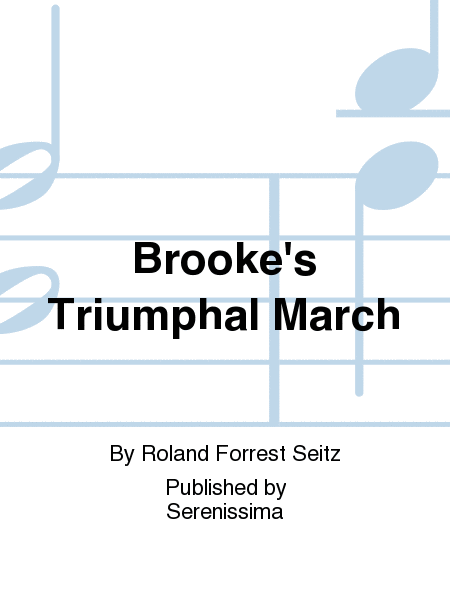Brooke's Triumphal March
-
Ships in 4 to 6 weeks
Details
Description
SKU: SA.40994
Composed by Seitz. Edited by Richard Sargeant. Original Works, Marches. Reprint Source: Edwardsville: Serenissima Music, Inc., 2013. Plate 40994. Romantic, American. Study score. Composed 1904. 22 pages. Serenissima #40994. Published by Serenissima (SA.40994).ISBN 9781608740994. 9.5 x 12.5 inches.
The American bandmaster, composer and publisher Roland Forrest Seitz was born in Shrewsbury, Pennsylvania, a township of Glen Rock, PA. One of eight children, his father died while Roland was still a boy, and he went to work as a printer's apprentice at a young age. Passionate about music, he studied on his own, learning the flute, then euphonium and cornet, and performed in his family band, as well as in the Glen Rock Band. He was only able to start formal music training at age 27 when he enrolled at the Dana's Musical Institute in Warren, OH, graduating from there in 1898. He returned to Glen Rock and became a full-time music teacher of winds, brass and percussion. He played in several bands in the area and became conductor of the Glen Rock Band. Seitz had begun composing works for band early in his career, and founded the Seitz Music Publishing Co. in Glen Rock, through which he published more than 50 of his own marches. As his publishing business expanded he also published works by many other major American band composers, including W. Paris Chambers and Karl King. A number of Seitz's marches were written for specific groups or people, such as the New York Journal March (published 1897), and the well-known University of Pennsylvania Band March, written in 1900. He wrote two marches for Thomas P. Brooke, the conductor of the famous Chicago Marine Band: Brooke's Chicago Marine Band March (1901), and Brooke's Triumphal March of 1904. Of the two, Brooke's Triumphal March has remained the most popular. Richard Sargeant's edition is a welcome addition to the standard band repertoire, with its easy-to-read format which can be used as study or performance score. It is scored for extended winds plus SATB saxophones, full brass, and snare drum, cymbals and bass drum.

 Share
Share